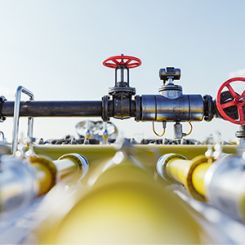
Usually, when an operational flow meter requires verification, it must be uninstalled from its location and transported to a facility where the necessary verification can take place. An on-site verification device can speed up and simplify this process at a fraction of the cost. With the right meter, the result can even be as accurate as any off-site verification.
Off-Site Vs. On-Site Verification
In many water and wastewater treatment plants, flow meters are installed to ensure efficient operation. They are strategically located to feed control systems with vital flow rate information that can be used as a base for adding or dosing chemicals, measuring water consumption or monitoring installation efficiency. Optimal performance is required to secure growth and sustainability, so an application not performing at its best can make the difference between making or losing money. For example, given the sheer volume of water transported through a large distribution pipe, a leak that goes undetected can lead to a tremendous amount of lost revenue.
To keep a plant up and running, the plant operator needs to be certain that each flow meter is operating 100% correctly. Upon delivery, meters are usually calibrated to ensure proper measurement. However, if the device operates under harsh conditions, if it has been running for hours on end or if the operator simply questions the meter’s performance, validation may be in order. Doing so can be difficult and time-consuming since the process usually involves removing the equipment from the plant and sending it to a factory for testing. This requires that the plant be shut down in order to uninstall the device. This means hours of hard work, lost production time and, ultimately, high costs.
As an alternative, the plant can consider on-site verification, during which a portable measurement device is used to verify the performance and accuracy of the installed meter. This allows for verification while the meter is still in operation, a clear advantage for the plant operator since it eliminates the need for a process shutdown. However, this type of verification is only useful if it is equally as accurate and reliable as its off-site counterpart.
Versatile & Accurate Clamp-On Flow
Among the options typically used for on-site flow verification today, portable clamp-on ultrasonic flow measurement technology is of particular relevance to the water and wastewater industry. Since this type of flow meter is based on the ultrasonic flow measurement principle, it offers several advantages over other flow technologies.
First, it can be used to measure practically all conductive or nonconductive liquids, whether they are clean, moderately aerated or contain suspended solids. This basic feature makes it possible to check the performance of existing meters in any water and wastewater plant measuring, for instance, raw sewage, effluent or fresh water. Other application areas include large intake or distribution pipes in the irrigation industry.
Second, measurement accuracy is typically around 1.0% of flow rate in typical field applications, with repeatability on the better side of 0.015%—making it ideal for verifying high-precision measurement tasks, such as adding chlorine to drinking water.
Additionally, it can be used to verify any brand and type of flow meter based on traditional flow measurement principles, including ultrasonic, electromagnetic, orifice and rotary piston.
Portability & Long Battery Life
Portable clamp-on ultrasonic flow technology is powered by a battery with a minimum of 12 and a maximum of over 24 hours of operation when fully charged. The battery is easily replaced in situ with a hot-swap feature, and the transmitter remains powered while the battery is being changed so measurement is not interrupted. The meter can be ordered with a selection of sensors that fit the most common pipe sizes and types.
These externally mounted sensors can be quickly installed on the outside of the pipe. As a result, this type of device can be transported from one installation to another—facilitating surveys and monitoring of temporary or permanent flow meter installations.
Using on-site portable clamp-on ultrasonic flow meter technology to verify the performance of existing meters introduces several important benefits for water and wastewater treatment plant operators, but one is the most persuasive of all: easy, reliableflow verification without any devices ever having to leave the plant.

